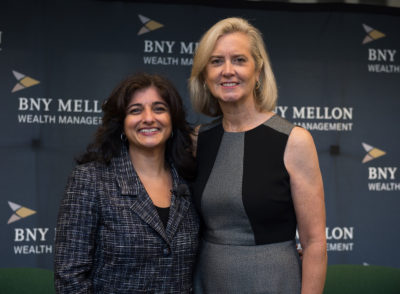
Fewer than 10 percent of all U.S. fund managers are women, according to a study released by Morningstar in 2015. And if the current trends hold, that percentage will be smaller in the future.
Seema Hingorani, founder and chair of Girls Who Invest, spoke about her mission to increase the number of women in investing at BNY Mellon’s “Game Changers” event last Thursday.
“One day I hope we won’t need a Girls Who Invest because there’ll be plenty of women sitting at the table making these really tough investment decisions,” Hingorani said.
Girls Who Invest, a nonprofit founded in 2015, is dedicated to empower women to enter the asset management industry. The program gives its participants access to funded education, paid summer internships and an introduction to a growing, supportive community of women employed in asset management roles.
Previously the chief investment officer for NYC Retirement Systems, Hingorani managed billions in assets and she is committed to tackling issues of diversity in the asset management industry.
In 2014, Hingorani wrote about her mission in an article for Bloomberg titled, “’Girls Who Invest’ Would Change Wall Street.” The article’s impact, she said, shocked her and eventually altered the trajectory of her career.
“After that, I thought I was done,” she said. “I just wanted to get the conversation started.”
Yet over three years later, Hingorani is minutes away from giving a speech about Girls Who Invest to a room full of industry leaders, entrepreneurs and CEOs.
“[After the article] I got so much of an overwhelming response from men and women in our business and college professors saying ‘We want to help you do this,’” Hingorani said. “I thought ‘Okay, I guess I have to do it then.’”
Hingorani’s speech drew not only on research but also on her personal story. Her parents emigrated from India, and she described how being brought in a family where everybody was encouraged to give back to the community affected her experience with investing.
Despite the expectation that she would study to become a doctor, lawyer or engineer, Hingorani said she fell in love with the markets through melhor app de trading and wanted to become an investor.
“I forced my brother to come to dinner with my parents to break the news — ‘I want to go to business school, I don’t want to go to law school,’” Hingorani said.
She said felt disconnected from her own community, which strongly values charity. Hingorani said she was determined to find a way to give back while pursuing her passion.
Hingorani funded charity work in India, specifically the building of a library for a village school. Her approach of problem solving as challenges with charity work arose, she said, prepared her for founding and running Girls Who Invest.
Cassidy Murphy, editorial and media relations director at The Warren Group, said hearing Hingorani’s story inspired her.
“Honoring women like Seema Hingorani as game changers is inspiring and enlightening,” she said. “Seema’s story was really interesting. As a woman and a minority, she already has two strikes against her in the investing world, and her success is as remarkable as her commitment to helping other women attain the same success.”
Vicary Graham, president of BNY Mellon Wealth Management New England, said she was excited for a chance to discuss issues of gender diversity in investing.
“The more we do seminars on topics like this … more of the unintended biases come out in these kinds of conversation,” Graham said.
Harassment, Hingorani said, has affected women in asset management and should be dealt with.
“It’s really a shame to see some of the recent articles about harassment and things that are going on inside the asset management industry, in addition to other industries, but you know what? We have to have the conversation. Let’s figure out how to make it better,” she said.
Hingorani said the solution to these issues requires a concerted effort to discuss these problems.
With over 1,000 applicants for the 100 positions available in 2018, Girls Who Invest has attracted much interest. But this, Hingorani said, is just the beginning.
“My goal is to have 30 percent of the world’s investable capital managed by women by the year 2030. I call it my ‘30 by 30’ vision,” Hingorani said.
















































































































